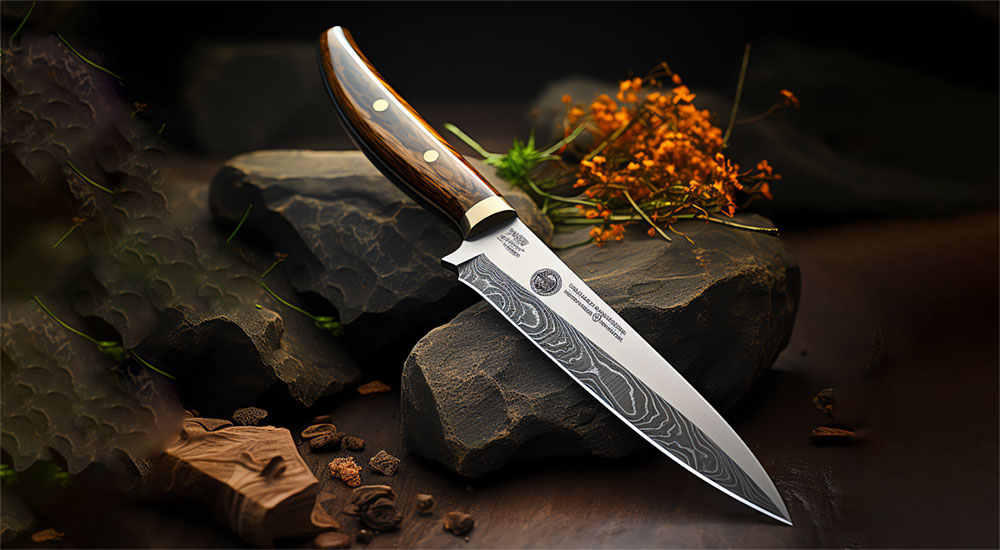Shun Knives: A Slice of Perfection and Why Rejuvenated Knives Will Keep Them Sharp
 A Tradition of Precision: The Story of Shun Knives
A Tradition of Precision: The Story of Shun Knives
Shun (pronounced "shoon") Cutlery stands as a shining example of Japanese craftsmanship, where centuries-old tradition meets modern innovation. Established by the Kai Group in Seki City, Japan, Shun embodies the rich heritage of Japanese sword-making. Known as the "City of Blades," Seki City’s reputation for high-quality cutlery dates back to the 13th century, and it remains a central hub for blade production to this day.
The Kai Group, originally a small pocketknife manufacturer founded in 1908, gradually expanded its expertise into kitchen knives. This evolution blended ancient techniques with contemporary advancements. Shun knives reflect the influence of traditional samurai swords, particularly through their intricate layering of steel. This method mirrors the creation of katana swords, which are prized for their unparalleled strength and razor-sharp edges
- Shun Cutlery - Wikipedia (Should open in new tab)
Steely Precision: The Blade Technology Behind Shun
At the core of Shun knives is their VG-MAX steel, renowned for its exceptional performance. VG-MAX is a high-carbon steel that delivers outstanding edge retention, durability, and corrosion resistance. This steel ensures that Shun knives stay sharper for longer periods, making them ideal for both professional chefs and home cooks. The blades are often clad with multiple layers of Damascus stainless steel, which not only provides a strong, razor-sharp cutting edge but also imparts a beautiful, wavy pattern on the blade. This pattern is a visual testament to the meticulous craftsmanship involved in creating each knife
- Shun Comparison Chart - Prudent Reviews (Should open in new tab)
Handle with Care: Shun’s Unique Grip Designs
Shun knives are celebrated not only for their cutting performance but also for their ergonomic and aesthetically pleasing handles. Many Shun knives feature PakkaWood handles, which combine the natural beauty of wood with the durability of resin. This design ensures that the handles are both moisture-resistant and exceptionally strong. Depending on the series, you’ll find a variety of handle designs. For instance, the Shun Classic series features classic D-shaped ebony handles that provide a comfortable grip, while the Shun Premier line offers symmetrical, ambidextrous grips for a versatile handling experience
Also Read: Choosing the Right Knife for Your Kitchen
Shun Knife Collections: From Premium to Practical
Shun offers a range of knife series to suit different preferences and budgets. Here’s a closer look, ranked from most to least expensive:
- Narukami Series: This premium line features Blue II carbon steel, known for its exceptional sharpness and edge retention. However, it requires careful maintenance to preserve its performance
- Dual Core Series: Distinguished by its construction with 71 alternating layers of VG10 and VG2 steel, this series offers superior sharpness and durability. The complex layering enhances both performance and visual appeal
- Premier Series: Combining a VG-MAX core with a hammered tsuchime finish, this series offers both beauty and functionality. It’s a luxurious option that delivers excellent cutting performance
- Classic Series: Featuring VG-MAX steel and a classic Damascus finish, this series is Shun’s most extensive and popular line. The D-shaped ebony PakkaWood handles provide a traditional yet ergonomic design
- Kanso Series: Inspired by the Zen principle of simplicity, this line uses AUS10A steel and features a rustic, minimalist look. It’s one of the more affordable options, offering a balance of performance and style
Why Rejuvenated Knives is the Perfect Partner for Your Shun Collection
Maintaining high-performance blades like Shun knives requires specialized care. Sharpening Shun knives, particularly those with VG-MAX or Blue II steel, demands precise techniques and attention to detail. That’s where Rejuvenated Knives comes in.
At Rejuvenated Knives, we specialize in sharpening premium cutlery, including Shun knives. Our expertise ensures that your blades receive the professional treatment they need to maintain their razor-sharp edges and stunning Damascus patterns. We understand the unique requirements for sharpening Shun’s layered blades, ensuring they perform at their best with every use.
Instead of dedicating your weekends to sharpening your knives, let Rejuvenated Knives handle the task. By entrusting us with your Shun collection, you can ensure that your knives remain in peak condition, allowing you to focus on what you love—preparing exceptional meals with the precision and ease that only Shun knives can provide.
Discover how Rejuvenated Knives can help keep your Shun knives sharp and ready for action. Visit Rejuvenated Knives and explore our expert sharpening services to give your blades the care they deserve.
Frequently Asked Questions
1.What are Shun knives known for?
Shun knives are celebrated for their exceptional craftsmanship, sharpness, and beautiful Damascus patterns, rooted in Japanese sword-making traditions.
2.What steel is used in Shun knives?
Shun knives primarily use VG-MAX steel for its outstanding edge retention and durability, often layered with Damascus stainless steel.
3.How should I maintain my Shun knives?
Regular sharpening and proper care are essential. Use a honing steel regularly and trust professionals like Rejuvenated Knives for sharpening services.
4.What is the best way to sharpen Shun knives?
Sharpening Shun knives requires precision techniques specific to their layered blades. Professional services ensure optimal performance without damaging the blade.
5.Can Rejuvenated Knives sharpen all Shun knife collections?
Yes, Rejuvenated Knives specializes in sharpening all Shun collections, ensuring each knife maintains its unique cutting performance and beauty.
6.How often should I sharpen my Shun knives?
It depends on usage. Regular home honing can extend the time between professional sharpening, typically every 6 to 12 months for optimal performance.
- Oct 30, 2024
